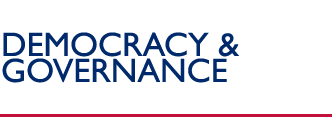Democracy and Governance in Senegal
The Development Challenge: Senegal is a democratic and predominantly Muslim nation, one of the most stable countries in an unstable region. A model of religious and ethnic tolerance, it plays a key role in conflict resolution in West Africa and beyond, and is committed to fighting terrorism. Senegal is an important partner of the United States because it has found a way to ensure social stability and religious tolerance without violence and repression. Senegal is one of the top performers among countries achieving eligibility status to the Millennium Challenge Account (MCA). It has made significant progress in educating its youth with gross school enrollment increasing from 71.6% in 2002 to 79.90% in 2004 (77.30% for girls and 82.40% for boys). Yet with half its nearly 11 million people in urban areas and a per capita income of $550, Senegal faces severe challenges: nationwide, 50% of young men are unemployed; 51% of men and 70% of women over 15 years are illiterate; 70% of the countryside has no electricity; and the standard of living has improved only modestly in the past 20 years.
While economic growth averaged 5% for the past eight years and is estimated at 6% in 2004, most of this growth is the result of an increase in domestic demand rather than increased trade and investment. The country is struggling to put in place further institutional reforms and to build key public infrastructure, both necessary to sustain long-term growth. Senegal is recognized as having the best macroeconomic profile among the eight West African Economic and Monetary Union (WAEMU) member countries as reflected by a zero level of inflation in 2003, no debt arrears and a low budget deficit (0.2% in 2003). However, Senegalese businessmen identified access to financing as the single most problematic factor for doing business. While the Presidential Investors Council instituted in 2002 has worked to attract private investors, some critical reforms still remain to be implemented to improve the investment business climate. Furthermore, Senegal has not yet succeeded, after several attempts, in privatizing two major public enterprises (the peanut and electricity companies) which continue to drain public resources. Corruption continues to be a challenge, as reflected in Senegal's rank of 85 out of 146 countries in Transparency International's 2004 corruption perception index. The Government of Senegal (GOS) recently established a committee to fight corruption and developed a plan to improve transparency in public management, including the adoption of a new procurement code.
Social indicators are improving due to substantial government and donor investments in education, health, and other social services. The GOS successfully reached the Heavily Indebted Poor Country (HIPC) completion point and has received debt relief. Thanks in part to this program, the GOS is now investing 40% of its budget in education (up from 33% in 2002) and 10% in health. According to the household survey conducted in 2001-2002, the percentage of persons living in poverty fell from 67.9% in 1994 to 57.1% in 2003. The survey also indicates that poverty remained greater in rural areas than in urban areas. The GOS is strongly committed to reducing the incidence of poverty to 50% by 2015. However, poverty reduction on this scale will require achieving annual growth rates of at least 8%. Senegal urgently needs growth, jobs, and the capacity to produce and manufacture goods rather than just trade them. In the social sectors, Senegal has increased the gross access ratio to the first grade of primary school (from 72.36% in 1996 to 85.1% in 2003), particularly for girls and children living in rural areas. Vaccination rates have increased from 67% in 2003 to 70% in 2004, after a precipitous drop in the late 1990s due to reduced donor funding. Good leadership, early policy dialogue, and social mobilization have helped Senegal contain the spread of HIV/AIDS, with prevalence currently at 1.4% of the population.
U.S. national objectives in Senegal are threefold: (1) contributing to peace, stability, and the consolidation of democracy in the region; (2) supporting Senegal's efforts to strengthen democratic systems and accelerated economic growth; and (3) combating terrorism. USAID's program of assistance in Senegal is particularly attuned to the priorities expressed in the joint USAID-State Department Performance Goals. It supports the joint objectives of promoting stable political and economic conditions that prevent terrorism from flourishing and strengthening institutions, laws, and policies that foster private sector led growth, macroeconomic stability, and poverty reduction. Senegal is still fragile, however, and will continue to need substantial assistance to resolve the conflict in the Casamance region and to create a sustainable growth dynamic that effectively attacks poverty and strengthens and deepens democracy, thereby safeguarding stability. It is in the U.S. interest to continue a robust USAID program that tackles the problems of poverty and fosters a peaceful environment in the Casamance so that Senegal can continue to serve as a role model for the rest of West Africa.
The USAID Program: The program's objectives tackle the major constraints to Senegal's development. To encourage economic growth, the private enterprise program will make it easier to start and operate a business and build trade capacity, particularly for nontraditional agricultural and natural products. To strengthen democracy at the grassroots, funds will be used to improve the effectiveness, transparency and accountability of local governments as well as broaden political participation. The health program targets HIV/AIDS prevention and treatment and improving the health of women and children, particularly through reduction in malaria and other infectious diseases. The basic education program, in collaboration with the President's Africa Education Initiative, will increase the number of children, especially girls, who complete middle school. Finally, USAID will request additional FY 2005 funds for community-led peace initiatives in the Casamance to reinforce resolution of that long-running conflict.
(Excerpted from the 2006 Congressional Budget Justification for Senegal)
Back to Top ^
|


